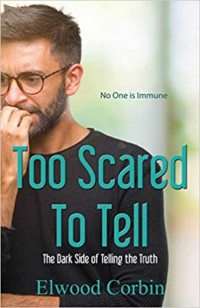Title: Too Scared to Tell: The dark side of Telling the Truth
Author: Elwood Corbin
Publisher: First Edition Design Publishing
ISBN: 978-1506909936
Genre: Social Sciences
Pages: 188
Reviewed by: Allison Walker
Pacific Book Review
If honesty is a virtue, why is society all too willing to ostracize those who tell the truth? Call them tattletales, squealers, rats or snitches, we don’t use very nice words to describe someone who’s willing to speak up when they witness wrongdoing. Too Scared to Tell: The dark side of telling the truth, by author Elwood Corbin, examines the extreme paradox of whistle blowing. The penalties, and contradictions, of snitching transcends age. A child or an adult can be equally admonished for being a snitch or, alternatively, punished for not saying something which could prevent tragedy. It’s a catch twenty-two no matter which way you look at it, according to Corbin. But how did we get here?
The culprits of perpetuating the bad reputation of the squealer includes parents, teachers, the media, and the community at whole, claims Corbin. Parents and teachers indoctrinate the idea into children at an early age, then the media sensationalizes it throughout adulthood. Newspapers glorify criminals and vilify squealers. Whistleblowers may be scorned by their communities or retaliated against by their workplaces. The law, when motivated to protect witnesses, is too often underfunded and ineffective. Too Scared to Tell presents a horrific amount of evidence by way of headlines, case studies and legal disputes to prove just how emotionally and physically dangerous it can be to be labeled a rat. Readers will feel ashamed, terrified and furious – all at the same time.
Corbin is thorough in his criticism of this culture, and it doesn’t end with teachers and media. Corbin also rails against the 1986 Drug Abuse Act, a decision which allows criminals to reduce their significant prison sentences if they’re willing snitch on a few friends. Corbin calls this the “Law of Unintended Consequences” and provides evidence to support just how willing criminals are to turn in a few friends, whether guilty or innocent, in exchange for saving their own skins.
Most damning, experts find that tattling serves an important purpose for children in establishing the “shape of society.” Children must learn rules in order to participate appropriately in their community. This is why telling children what is right or wrong can sound like gospel to their little ears. They use these rules form perceptions of their society and their place within it. To admonish a child for tattling confuses this perception and ultimately sacrifices a teachable moment between educator and child. Corbin provides an example, saying a child is told to never shove another child. If that child is shoved by a bully but scolded for “telling on” the bully, this confuses their perception of what is right or wrong. In scolding the child, the educator also neglects to speak with the child about the difference between an accidental stumble and a malicious shove.
Too Scared to Tell: The dark side of telling the truth is a deep dive into the culture which punishes whistleblowers and rewards criminals all in the name of “no one likes a tattletale.” Elwood Corbin is thoughtful, well-researched and provocative. He lights a lamp to illuminate the problem everyone wants to turn a blind eye to.


